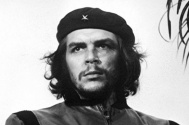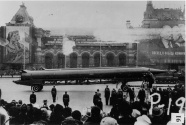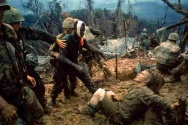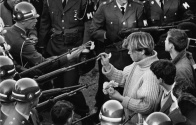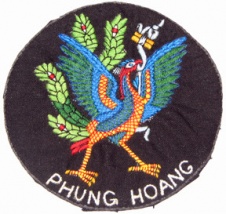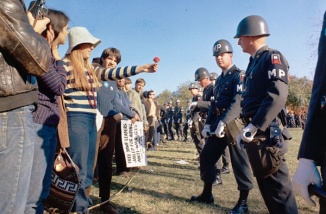1960s
| 1950s« | |
|---|---|
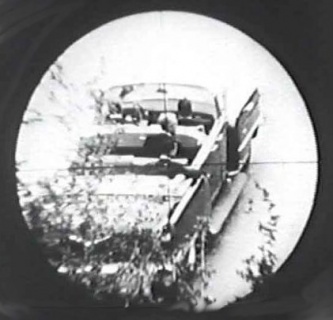 | |
| In the early 1960s a cabal of ruthless, rich and increasingly desperate men organised the JFK assassination. None of them was successfully prosecuted for this coup, which quickened the group into becoming the cabal which still controls the US Presidency to this day. |
The 1960s was a pivotal decade in the development of the US Deep State. Following the growing effectiveness of the CIA in covert regime change operations abroad, a small group of rich men used this same group at home. The JFK Assassination and ensuing cover-up quickly transformed this ad hoc group of profit seekers into the cabal which still directs the US political machine today.[1] The Vietnam War provided a cover for the groups netting of huge profits from involvement in the illegal drug trade, operations that were to be stepped up in the 1970s and 80s.
Contents
JFK Assassination
- Full article: John F. Kennedy/Assassination
- Full article: John F. Kennedy/Assassination

A small group of CIA insiders, oil barons, Vietnam war profiteers and others known to be hostile to the policy of John F. Kennedy arranged and executed his assassination in Dallas, Texas in November, 1963. The complex plot went almost according to plan, though the "lone nut", Lee Harvey Oswald was not killed but captured alive - something remedied two days later when he was murdered by Jack Ruby. The new US President Lyndon B. Johnson moved quickly to contain the facts of what happened, and large commercially-controlled media support proved decisive in the short run at containing disbelief of the Warren Commission's obvious fraud.[2]
1960s Assassinations
- Full article: 1960s/Assassinations
- Full article: 1960s/Assassinations
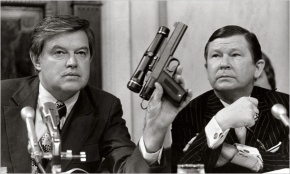
Empowered by successfully committing one high profile assassination, the cabal increasingly used such methods as a way of dealing with opponents whom they could not bribe or blackmail into compliance. Most of these were done in secret using CIA-developed technologies exposed in the 1970s after investigations by the House Select Committee on Assassinations.
Exposure
In the 21st century, the role of the US Deep state is increasingly well understood in the US assassinations of the 1960s. WhoWhatWhy reported in 2019 that:
“After five decades, the mysteries behind the assassinations of John F. Kennedy, Robert F. Kennedy, Martin Luther King Jr. and Malcolm X may finally get the scrutiny they deserve. A group consisting of relatives of the Kennedy and King families, as well as their confidantes and other prominent voices, is calling for a Truth and Reconciliation Committee to get to the bottom of these tragic murders.”
(19 January 2019) [3]
Vietnam War
- Full article: Vietnam War
- Full article: Vietnam War
LBJ reversed JFK's policy on the Vietnam War and deployed increasing numbers of US ground forces, under the doctrine of "containment". This allowed the CIA to carry out the Phoenix Program - destructive research into the effects of extreme violence and sadism on the populations of Vietnam, Laos and Cambodia. Probably the main effect of the war was expanding the CIA's drug trafficking operations.
War resistance
As the Vietnam War continued without a victory in sight, the US public was increasingly swayed by anti-war campaigners such as Martin Luther King and Noam Chomsky. This flowered into a non-violent anti-war counter-culture, which mobilised unprecedented numbers of young people, for example in 1967 in the Summer of Love in San Francisco. Like the Occupy Wall Street movement of 45 years later, this expression of mass dissent appeared to bemuse and catch the establishment off guard.
As well as the usual violent repression, the establishment also attempted to understand the psychology of those involved in the anti-war resurgence of the late 1960s. The 1970 Bilderberg, for example, had a working paper on Young Americans' Attitudes Towards Foreign Policy for the 1970s, by Graham Allison.[4]
An illustration of how policy can develop a life of its own is provided by Richard Nixon's launching a "war on drugs", which was conceived as a clandestine attack on anti-war protestors and negroes.[5] This was later to prove a goldmine not only for the deep state groups involved in the illegal drug trade, but also the prison-law enforcement complex.
Decolonization
- Full article:
 Decolonization
Decolonization
- Full article:
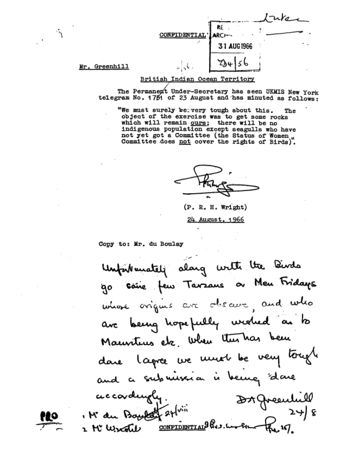
During the 1960s, former European colonial powers continued to grant political independence to local inhabitants. On occasions, this was a brutal or bloody process. From 1968 to 1973 the UK military forced the residents of the Chagos Archipelago off their land in order, as explained by Denis Greenhill of the colonial office "to get some rocks which will remain ours; there will be no indigenous population except seagulls who have not yet got a committee. Unfortunately along with the Birds go some few Tarzans or Men Fridays whose origins are obscure, and who are being hopefully being wished on to Mauritius etc." The islands remain a US military base to this day.
Cryptocolonisation
Western deep states exerted their continued determination to control nominally independent colonies (and other nation states) through groups such as the CIA or MI6. Successful coups were arranged in Greece and Brazil and various assassinations of political leaders were carried out.[6]
Deep state globalisation
The Bilderberg continued to meet annually, in almost complete secrecy, and promote the cause of a united Europe. James P. Lucier's 1963 piece entitled The Bilderbergers, a very rare exception to the near perfect news blackout, caused some concern within the group. In 1968, Carlo Pesenti invited David Rockefeller to attend a meeting of Le Cercle, which expanded the group's orbit outside Europe for the first time, and lead to it also to have regular meetings in the US.
Related Quotations
| Page | Quote | Author | Date |
|---|---|---|---|
| Interpen | “Interpen (Intercontinental Penetration Force) was established in 1961 by Gerry P. Hemming. Other members included Loran Hall, Roy Hargraves, William Seymour, Lawrence Howard, Steve Wilson, Howard K. Davis, Edwin Collins, James Arthur Lewis, Dennis Harber, Bill Dempsey, Dick Whatley, Ramigo Arce, Ronald Augustinovich, Joe Garman, Edmund Kolby, Ralph Schlafter, Manuel Aguilar and Oscar Del Pinto. A recently declassified document says that in 1962, Robert Emmett Johnson was a member of Interpen. Later that year Johnson invited Robert K. Brown (USAR/CounterIntelligence Corps) to a meeting in Miami. Brown was the publisher of Alberto Bayo's 100 Questions for a Guerrilla. This book included an article written by Ulius Amoss called Leaderless Resistance which "referred to the proper strategy for conducting resistance operations against Castro and inside/outside of Cuba". The document also goes onto say: "Also included were numerous fotos of the G/W instructor cadre of InterPen which were taken by Brown at the Everglades training camp." Interpen was also involved in training members of the anti-Castro groups funded by people like Roland Masferrer, Carlos Prio and Santos Trafficante. When the government began to crack down on raids from Florida in 1962, Interpen set up a new training camp in New Orleans. The group carried out a series of raids on Cuba in an attempt to undermine the government of Fidel Castro. These stories were reported by the photo-journalist, Tom Dunkin, for Life Magazine. Roy Hargraves working closely with Felipe Vidal Santiago, carried out a series of raids on Cuba in the 1960s (23 in 1962). This involved a plan to create a war by simulating an attack on Guantanamo Naval Base. In 1963 Hargraves led a team of exiles in a successful raid on Cuba. After capturing two Cuban fishing boats Hargraves took them to the Bahamas. Some members such as William Seymour and Edwin Collins, worked with Bernardo De Torres on non-Interpen operations in 1963. Declassified FBI files show that the agency had an informer within Interpen. His code name was MM T-1. In one document dated 16th June, 1961, it said that MM T-1 had “been connected with Cuban revolutionary activities for the past three years”. One document dated 12th May, 1961, claims that Allen Lushane of Miami “had made a trip to Texas to recruit Americans for some future military action against the Government of Cuba”. The document adds that the “first training camp was established by Gerald Patrick Hemming with Dick Watley and Ed Colby running the camp.” In an interview that he gave to John M. Newman on 6th January, 1995, Hemming claims that the FBI informer was Steve Wilson. Some researchers believe that a combination of Interpen members, CIA agents and anti-Castro Cubans were involved in the assassination of John F. Kennedy. This included James Arthur Lewis, Roy Hargraves, Edwin Collins, Steve Wilson, Gerry P. Hemming, David Morales, Herminio Diaz Garcia, Tony Cuesta, Eugenio Martinez, Virgilio Gonzalez, Felipe Vidal Santiago, Robert Emmett Johnson, Carl E. Jenkins, Chi Chi Quintero and William Robertson.<a href="#cite_note-1">[1]</a>” | John Simkin | 20 May 2015 |
| US/Deep state | “When Eisenhower warned against the military-industrial complex, the values, institutions, and resources that comprised it were still subordinate elements in American society. Today it not only dominates both parties, but it is also financing threats to both of these parties from even further to the right.” | Peter Dale Scott | 2015 |
References
- ↑ Document:The Political Dominance of The Cabal
- ↑ Document:The Coup of '63, Part 1
- ↑ https://whowhatwhy.org/2019/01/19/kennedy-king-families-to-congress-reopen-probes/ WhoWhatWhy
- ↑ File:Bilderberg-Conference-Report-1970.pdf
- ↑ http://tricountysentry.com/blog/top-adviser-to-richard-nixon-admitted-that-war-on-drugs-was-policy-tool-to-go-after-anti-war-protesters-and-black-people/
- ↑ US/Foreign Assassinations since 1945
